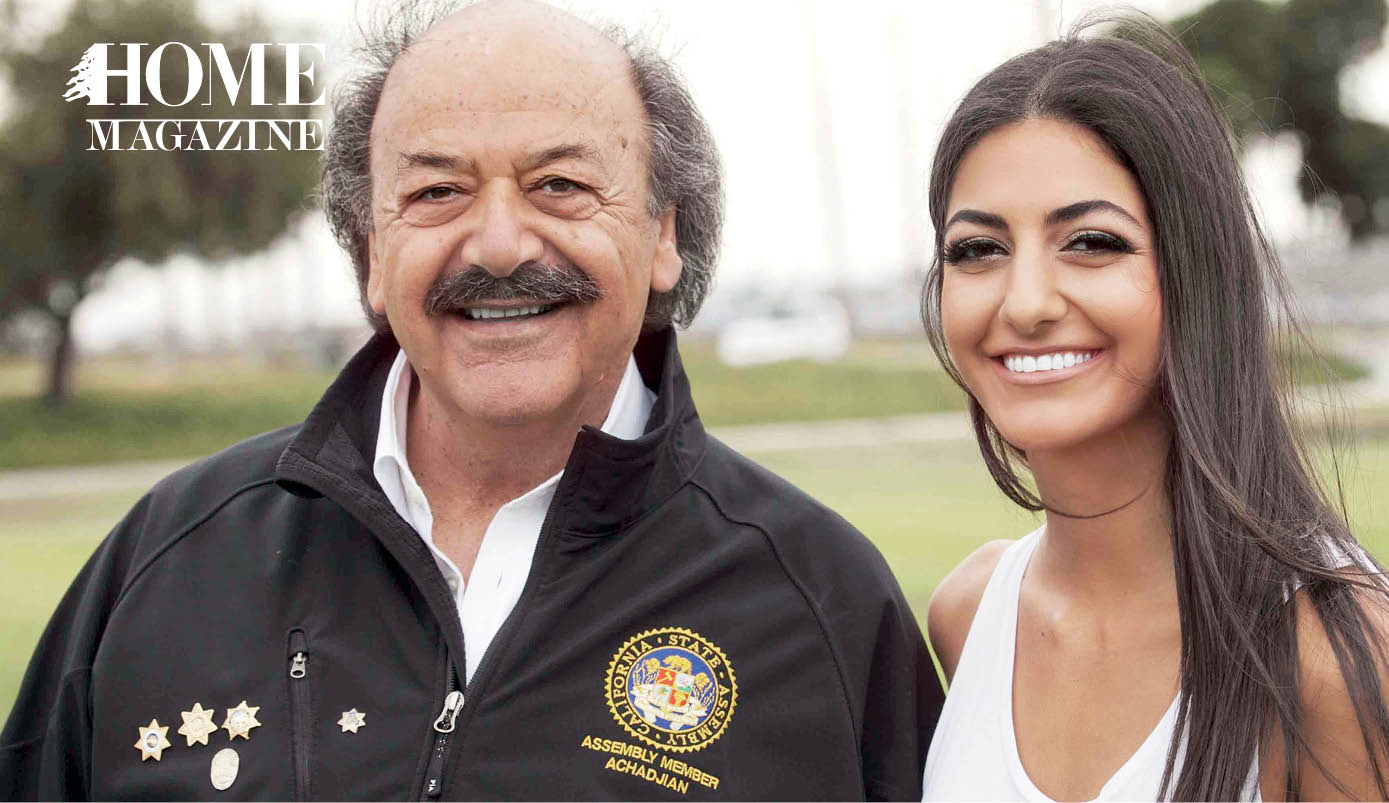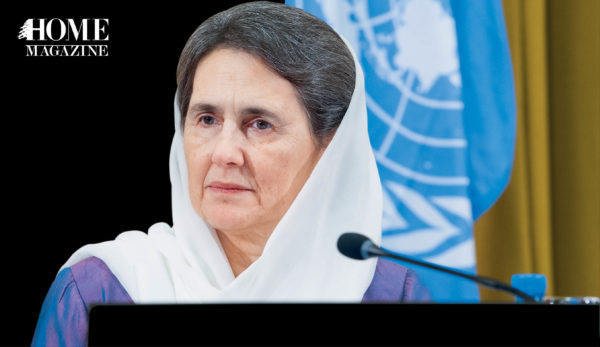It was a familiar day in San Luis Obispo, California. The clouds had yet again extended their vacation, allowing soft sunshine to blanket the Bishop Peak mountainside. Its warmth reached down and around into a back patio just across the street. Outdoor furniture with spring green cushions mimicked the sky’s embrace, making its guests feel right at HOME. After all, they were at HOME. My father and I, that is.
It was not uncommon to find us in the back courtyard on a weekend afternoon. Amid the chaos of being a public figure for decades, my father never lost his appreciation for a quiet moment and a good cigar. As he methodically enjoyed a medium brown Avo, I asked him to tell me about life in Lebanon.
Those who know my father best know he is a man of few words. So, it was to no surprise I had to branch out to other family members to learn the many interesting nuances of his story.
Khatchik Achadjian was born in the summer of 1951 in the small town of Jalala, Lebanon, to parents Hratchia and Mariam Achadjian. He was the youngest of four children and the only boy. “Katcho”, as he was called for short, attended Armenian Evangelical Elementary School in Jalala, and later secondary school in Anjar. His parents were self-starters, entrepreneurs before the term was coined. His mother owned and operated a small grocery store, while his father built a Shell gas station from the ground up. At the young age of 8, Katcho spent his weekends following his father and busying himself with learning the business — a task he took very seriously. It was the only gas station in the area then, and it still stands to this day, serving as a great source of pride for the Achadjian family.
Basketball came naturally to Katcho, who was an impressive athlete. He played for the school team and was so enamored with the sport that he coached the children of the local Armenian community. That included his next-door neighbor Araxie Demirdjian, with whom he was also enamored.
“When granted the luxury of leisure, his vacation of choice is Lebanon.”
Upon completing high school and in the midst of the Lebanese Civil War, Katcho followed his eldest sister to California in pursuit of a higher education. He began his studies at Cuesta Community College and continued to Cal Poly San Luis Obispo, where he earned a degree in business administration. “He would ride his bike all the way to the Shell station and then to class,” one of his sisters proudly recalled, explaining how he worked full-time at a local gas station to put himself through school. In 1978, Katcho purchased that very same station with the encouragement of friends and family, following in the footsteps of his father, who passed away just six months later.
In 1982, Katcho was awarded United States citizenship and two years later proposed to Araxie. Together, they expanded their small business into three locations, helped establish a bank, and enthusiastically participated in their surroundings. As a result of his involvement with dozens of charitable organizations, such as founding the local Rotary International Club, Katcho was propelled by his community to run for political office. He successfully did so and was officially sworn into the San Luis Obispo County Board of Supervisors in 1998, representing the region dubbed by Oprah as “the happiest city in America.”
Katcho was re-elected to the Board again and again, winning by more than 70 percent of the vote for his final term, serving for 12 years altogether. He steadily developed a reputation of fairness and integrity across political party lines, earning him coveted appointments by Governor Pete Wilson to the Mid-State Fair Board and by Governor Arnold Schwarzenegger to the California Coastal Commission, where he was charged with protecting the state’s pristine coastlines.
Katcho had completed his time as an elected official at the county level, but the community was not ready to let him go. They mobilized quickly, encouraging him to consider state office. With the blessing of his wife, Katcho campaigned to represent the Central Coast in the California State Assembly. He won three times and served for the maximum six years.
As a California state assemblyman, Katcho initiated critical legislation. He authored Assembly Bill 65 and worked to see it signed into law by Governor Jerry Brown, garnering national attention along the way. The “rape bill,” as it came to be known, closed a loophole in the state’s sexual assault law that dated back to the 1980s. It had been stalled by a Senate committee for years in typical bureaucratic fashion, but Katcho was able to push it through. When Anderson Cooper interviewed him on CNN, Katcho simply stated that it was “a common sense, no-brainer bill and the right thing to do.” That interview was a glimpse into his straightforward simplicity and exactly why people love him.

In my opinion, the greatest impact my father made was with legislation directly connected to his Lebanese-Armenian roots. Two of his grandparents were killed during the Armenian Genocide of 1915, a period in history that Turkey still denies to this day. During the persecutions, thousands were marched into the Syrian desert with the expectation that they would perish along the way. My dad would not have been born had his parents not escaped. They fled to Lebanon, where Katcho’s journey began.
“Katcho was the principal co-author of Assembly Bill 1915, the Armenian Genocide Education Act, which requires each and every school district in California to include the Armenian Genocide in its studied subject areas for grades seven to 12.”
Fast forward and Katcho was the principal coauthor of Assembly Bill 1915, the Armenian Genocide Education Act, which requires each and every school district in California to include the Armenian Genocide in its studied subject areas for grades seven to 12. It also requires the inclusion of Armenian Genocide survivor testimonies into the teachings of human rights. The bill unanimously passed both the California State Assembly and Senate, and was signed into law by the governor.
In 2013, Katcho joined the Honorable Consul General of Lebanon Johnny Ibrahim to celebrate 70 years of Lebanon’s independence with an official state resolution paying homage to the country he still calls HOME. My father’s travels have always been occupied with business, but when granted the luxury of leisure, his vacation of choice is Lebanon. Whether reconnecting with high school classmates in Zahle, supporting Homenetmen Beirut basketball games as president of Homenetmen Western Region USA himself, or stopping for knafeh bi jibneh on the way HOME from the Music Hall, my father’s heart lingers in Lebanon.
In many ways, although far from over, Katcho’s story has come full circle. As a descendant of genocide survivors and as a young man who traveled across the world in pursuit of the American dream, he has worked each and every day for his family, his community, his country and his history.
And as we sat in the back courtyard on that softly sunlit day so familiar to San Luis Obispo, my father’s cigar break would not have been complete without the light sound of Fairuz’s “Bahebak Ya Lebnan” coming from the speakers of our HOME, transporting him back to childhood in Lebanon.
He smiles at me when I ask him to tell me about life in Lebanon, and says, “Yaaish Lebnan.”
For more info: https://en.wikipedia.org/wiki/Katcho_Achadjian


































 by
by